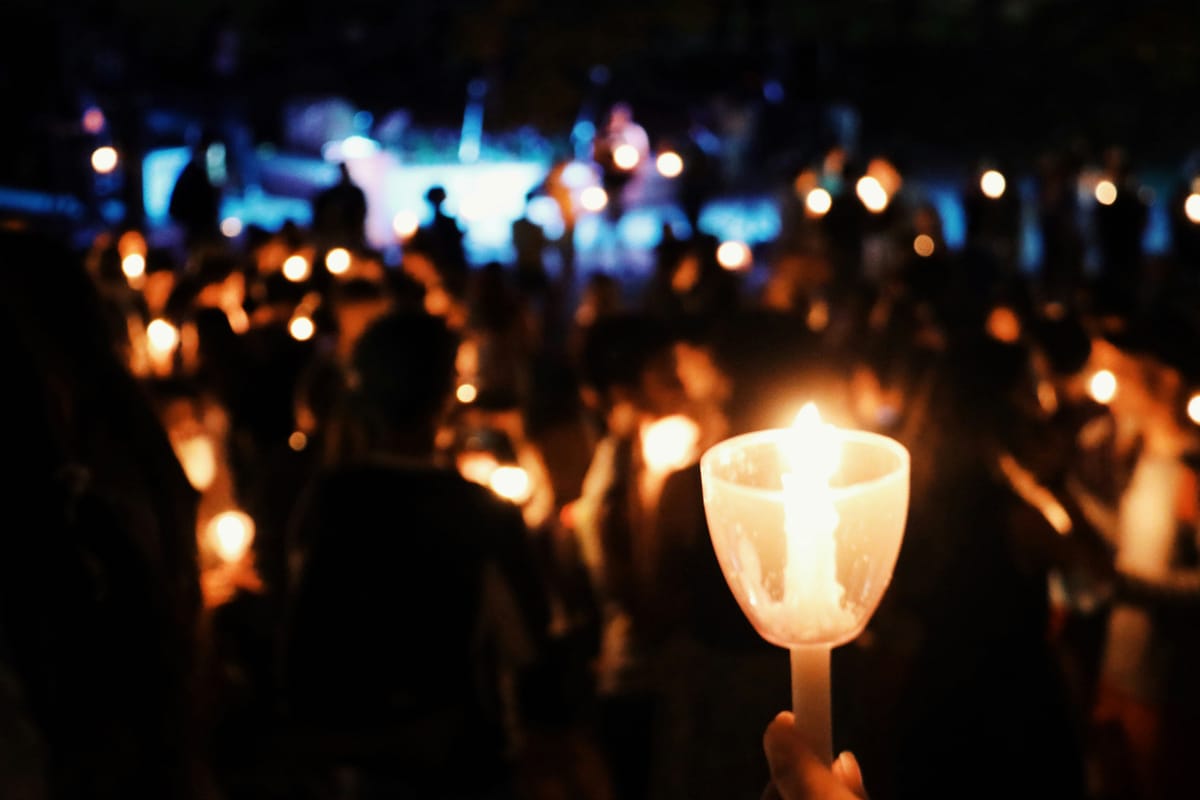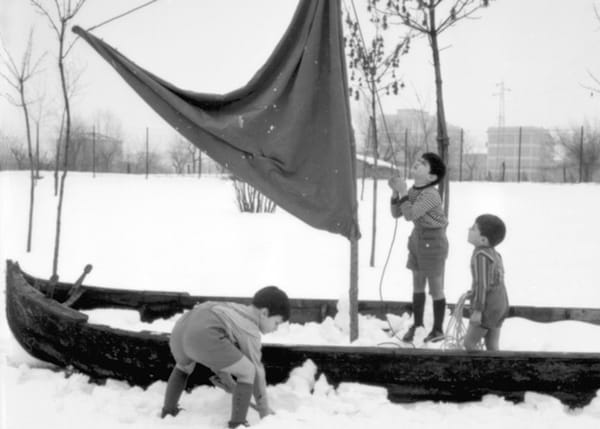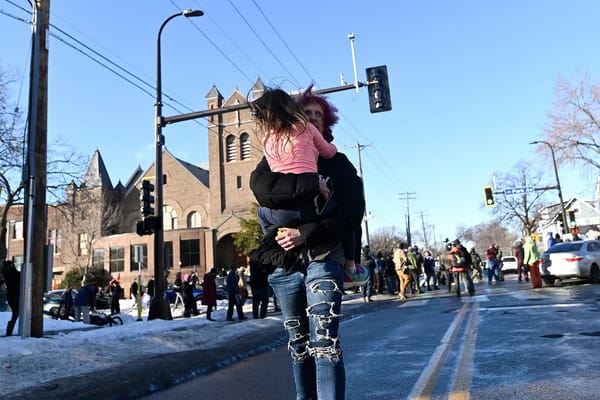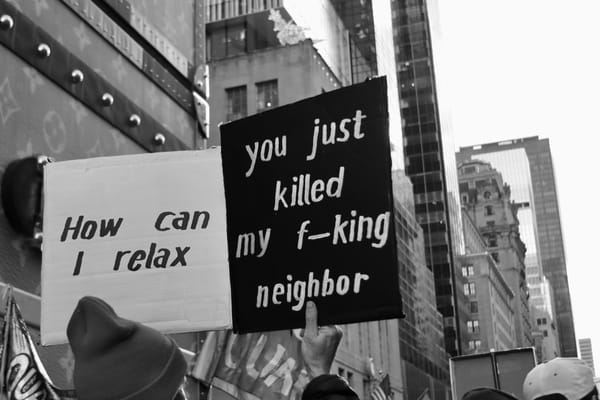The Land That Never Has Been Yet
Tools for sustaining hope in dark times and moving forward

Let me love the world like a mother.
Let me be tender when it lets me down.
Let me listen to the rain’s one note
and hear a beginner’s song.
~Maggie Smith
When young children get hurt, there is often a moment of held breath and total stillness before they cry out, as their body and spirit absorb what has happened. Every parent and teacher knows the very specific silence of this sharp inhalation and tightly held breath. The severity of a child’s injury can usually be gauged by the number of beats that pass in this tense pause before tears flow.
Whether the past week shocked you or confirmed your longstanding experience of our country, I think many of us felt a version of this deep and paralyzing gasp inward. I could hear and feel it in the eerie quiet, as I moved through the city. There is no way to rush the return of breath. But it will come. And when it does, it will only be the beginning of our grief, rage, and fear, but we will be more able to start taking steps forward again, through our sadness, through our worry, and through our anger.
The inhalation will surely last longer for some than for others, and, as with children, this will probably be proportional to the depth of the wound. This doesn’t mean that we cannot continue to move collectively forward, but we will need to give each other the grace and compassion to find air again. And those who are ready sooner will need to get to work more quickly, because there are urgent actions that are important now.
There is a metaphor often cited in these moments, which reminds us that a choir can sustain a note while individual singers pause to breathe, because the collective voice holds the sound. However, this only works if each individual commits, within themselves, to raise their voice as soon as they are able, to carry the note for others when they need to rest, and to fold in each new voice as it returns.
The tug of despair is strong, and it is helped along by anger and anxiety. Hope requires resilience, endurance, and determination, all of which have been stretched thin as we’ve moved through the many challenges of recent years. And—especially for those in more vulnerable communities, who have had to work to assert their humanity for so long in the span of history and have revived hope again and again, only to feel repeatedly betrayed by their neighbors and their country—the anger and exhaustion may feel overwhelming and insurmountable. We each owe it to those who are more vulnerable and have struggled longer to take extra care to hold the note for them now, as we move through this period of penumbra.
In order to continue moving forward, it will be critical to stay grounded in the habits of mind and spirit that will help us care for each other and continue the difficult but essential work of not surrendering to immobility. The paralysis that despair and anxiety breeds only allows those who seek unconstrained power to gain more ground. So it is imperative that, even as we continue to mourn, we exhale, reach for hope, and begin taking steps forward again.
A Mental Toolkit for Avoiding Despair
- Remember that there is a difference between grief and despair.
The deep sorrow of grief is an appropriate response to profound loss. And by loss, I am not referring to a simple election loss. In a more typical democratic cycle, we might be feeling disappointment and frustration. That is not the experience we are in now. A vision of the future that held possibility has succumbed to one that feels grim, oppressive, chaotic, and frightening. Many of us are anticipating the loss of hard won rights and the cementing of losses that have already occurred. And we are looking ahead to grave consequences, not only for individual rights, but for democracy, the global order, and the climate. All of these losses are dire and worthy of mourning.
However, despair is different; despair is the complete absence of hope. When we despair, we can do nothing else, because despair robs us of any reason to move forward. Grief can be carried, even as we carry on and carry one another. Despair does not leave any room for this.
Allow your grief. Grief is a sign that you care deeply about something, and that is precious. Let that feeling make a home in you so that you continue to care. But do not let it numb you and steal your ability to see anything other than the darkness.
- Take care of your heart. Rest. But don’t wait for grief to pass.
Grief is the tuning fork of care. There are no stages of grief, and there isn’t an end point to grief, but there is also more than grief. We will continue to grieve and rage, and we will also find ways to remember joy and connection and peace, no matter how dark the world gets. And we will need to keep moving forward through it all, because there is essential work ahead—life saving work. We can carry our grief as we work. We can even allow it to fuel our work. But we can’t afford to wait until it lifts completely.
- Find moments to breathe, even as you keep moving forward.
When I was in the midst of a very frightening period in my life, a wise friend asked me where I was finding oxygen in my days. It took me years to fully understand and incorporate this wisdom. When we are being fueled by adrenaline, it is very difficult to take small pauses. But there is a limit to how long we can function on adrenaline alone. We have a long haul ahead, and many of us are already exhausted from all that has come before this moment. We are going to have to find ways to breathe as we go. Whatever allows you to breathe a little easier—music, art, running, dancing, cooking, conversation, books, nature—identify your sources of oxygen and weave them into your days and weeks, so you will have air in your lungs to keep going.
- Allow yourself to be clear-eyed about difficult realities.
We cannot hold onto hope by looking away from all that is broken in the world. As Hannah Arendt instructed us, hope is not “reckless optimism.” Hope requires that we be clear-eyed about the difficulties and the bleakness of the present and nonetheless commit actively to the possibility of a better future. In the words of James Baldwin,
“One discovers the light in darkness, that is what darkness is for; but everything in our lives depends on how we bear the light. It is necessary, while in darkness, to know that there is a light somewhere, to know that in oneself, waiting to be found, there is a light.”
In despair, we resign ourselves to the worst outcomes in advance. In hope, we acknowledge the darkness and resolve to move through it. We nurture the light “uncertain and flickering” as it may be.
- Be kind. Hold onto your humanity and the humanity of others.
Be kind to yourself and to others. Be especially kind when you observe someone else’s vulnerability. Like hope, kindness is not ethereal or insignificant. It is not the same as simply being nice or civil. Committing to kindness is a way of committing to our own individual humanity and to our shared humanity. Naomi Shihab Nye says,
“Before you know kindness as the deepest thing inside,
you must know sorrow as the other deepest thing.
You must wake up with sorrow.
You must speak to it till your voice
catches the thread of all sorrows
and you see the size of the cloth.”
True kindness requires that we recognize the web of sorrow that connects us all. Despair robs us of this, too, because we are only able to grasp our own, individual sorrow as we wade through despair.
The isolation that grows out of this sense of separation from others is not only dangerous on an individual level. It is the permission slip that allows us to succumb to the path toward totalitarianism. This isn’t hyperbolic; Arendt warned us of this as well.
Kindness is neither weak nor insignificant. It is a critical act of connection, and as such it is an act of resistance. Practice kindness and guard your capacity for it fiercely.
- Avoid becoming mired in defensiveness.
When we are frightened and angry, we lash out. Try not to. We are all better and safer when we care for one another. But, perhaps even more importantly—especially if your identity grants you greater safety than others—be prepared to give grace when you are on the receiving end of someone else’s anger.
It is clear that, despite a lot of media attention on the mobilization of white women, we did not move the needle on the majority of white women’s votes. The results among white men are even more stark. Though we won’t have nuanced election data for a while, these demographic facts are evident. It is both understandable and appropriate for there to be anger among those whose communities were left behind at the ballot box.
In particular, many Black folks, especially Black women, who have led the way for centuries, are expressing anger and a feeling of betrayal. Their rage is justified and deeply historical. Honor it. Listen to it with gentleness and humility, no matter how you personally voted. The same goes for men listening to women’s anger. None of us will heal or be able to do the work that is required in defense of our collective future if we can’t look beyond individual ego in the face of reasonable resentment, accumulated over centuries.
- Remember that progress takes a long time and has many setbacks.
As imperative as it is for us to be clear eyed about the urgency of the moment, it is equally important to remind ourselves that all progress toward freedom and the protection of individual rights takes a long time and includes many heartbreaking setbacks.
It took nearly 100 years to end slavery and close to 150 years for women to get the vote. It took another 45 years for the Civil Rights Act to be passed, and 50 more for marriage equality. Globally, dictators have been toppled before but only through great struggle. Our recent period of turmoil and backsliding has felt exhausting in the scope of a lifetime, but the scope of history requires endurance and a wider lens.
I am unwilling to give up on the slow and arduous work of progress within the long arc of history. We owe it to those who worked tirelessly in the past, and to our children, not to give up now. Let’s remember Amanda Gorman’s words, which I also shared last week,
“Let the globe, if nothing else, say this is true:
That even as we grieved, we grew,
That even as we hurt, we hoped,
That even as we tired, we tried.”
- Seek out opportunities for empathy and inspiration. Then get up and get to work.
It is important to stay informed, but it is also important to allow yourself to be inspired. Research shows that when we are moved by other people’s individual stories, it affects us on a deeply neurological level. This is the literal biology of hope and it requires nourishment. The stories that inspire us are the ones that provoke empathy and push us toward action.
So, I want to leave you today with a few glimmers of inspiration. These are the pinpricks of light in dark times that steady us. We must use them, not only to assuage our fears, but to motivate us to take real, meaningful steps. (More on how to take those steps in the resources below.)
First, Shaundelle Brooks, whose son, Akilah, was killed in a mass shooting, used her grief as fuel and was elected to the Tennessee legislature last week. Be inspired by her, and be inspired by Justin Jones’ care for her, as she entered the statehouse as an elected representative for the first time.
Finally, I want to leave you with the words of my oldest friend’s dear husband, J.Stephen Brantley, who is a spectacular human and artist. In 2017, J.Stephen won the Doric Wilson Independent Playwright Award and spoke, in his acceptance speech, of his own despair and of being called out of despair to hope and action. To return to the important metaphor of the choir, J.Stephen reminds us that (even as we are being asked to listen to and engage with those who disagree with us) it is critical to care for and inspire those who are struggling alongside us for a better world.
J.Stephen Brantley accepting Doris Wilson Independent Playwright Award
Exhale. Rise. Be the choir.
Wishing you courage, fortitude, and hope,
Alicia
Resources & Action Steps
If you are ready to start moving forward, there are some important immediate actions that need individual engagement:
Make phone calls to help cure ballots in the still uncalled Senate and House races.
Urge President Biden not to make this a lame duck period and take decisive action before he leaves office to shore up democracy and global policy.
Urge your state representatives to take action to protect democracy at the local level. If you’re in New York, here are some specific local actions we need our lawmakers to pursue.
If you are looking for direction on how to stay active and engaged and are unsure of where to start, a few good options among many are: Protect Democracy, Indivisible, MomsRising, Public Citizen, and your local ACLU affiliate. I encourage you to not just donate but follow their action steps, and make it a regular habit to do so.
If you are interested in learning more about the risks of authoritarianism and totalitarianism and how they can be rebuked, in addition to Hannah Arendt, Masha Gessen has written extensively about these threats. Gessen also provides recommendations for further reading. Political Research Associates is another valuable source.
The title of this essay, “The Land That Never Has Been Yet” is drawn from the Langston Hughes poem, Let America Be America Again, which I encourage you to revisit as you look ahead with clear, fierce, yet hopeful eyes.
If you think someone else in your life might need some hope, please share. It’s always easier to hold onto hope when we’re not doing it alone.





